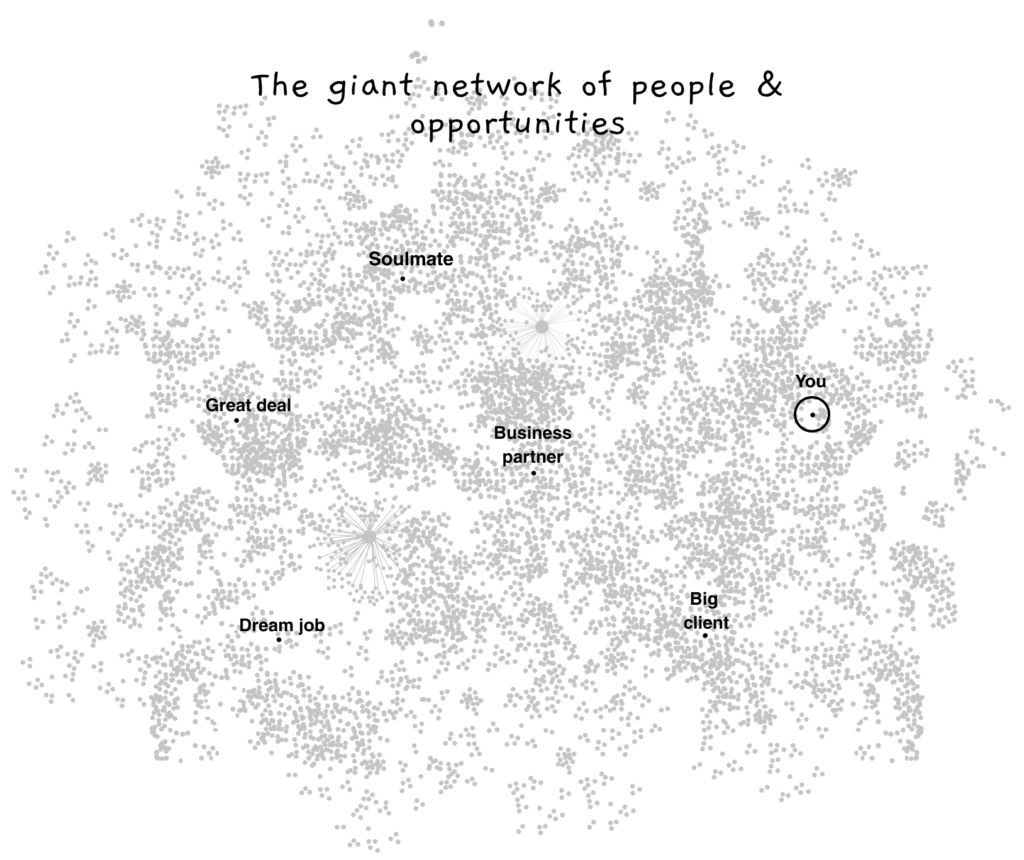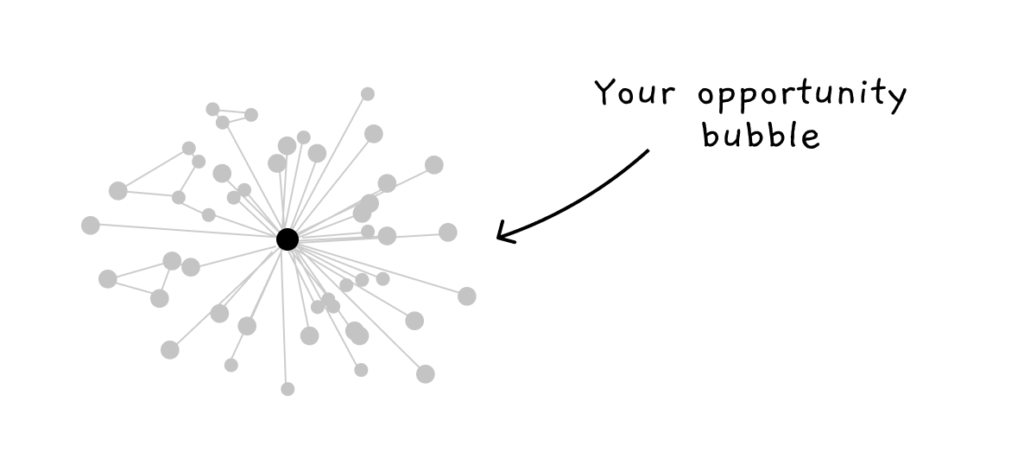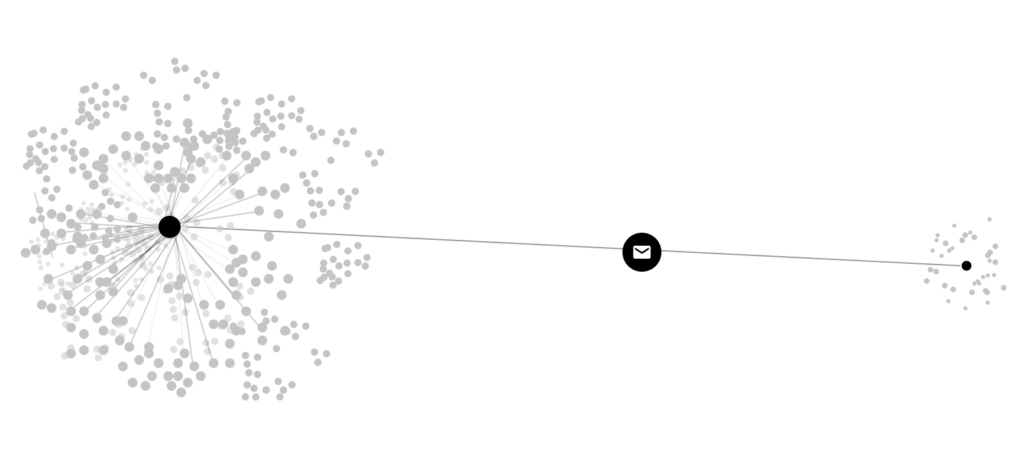Life is filled with random events and often one small coincidence can snowball into a chain of opportunities and shortcuts in life.
Unfortunately, those happy coincidences are not distributed evenly, some people enjoy them more than others. They happen to bump into the right people, they get unexpected invitations for the roles they want or opportunities that push them closer to their goals.
It’s easy to conclude that those people are simply luckier than others if we only take into account the random events that happen to be positive. But what if we compare exposure to randomness instead?
Luck would be impossible for a person, who is isolated and doesn’t interact with the world. Unlike someone who is in constant motion and interacts with new people on a regular basis. In that sense, luck can be increased, not by changing the odds of a single event in your favor, but by being exposed to more randomness in general.
This would make more sense, if you consider that the world is full of temporary opportunities that you could benefit from, but are beyond your reach. For a brief moment in time, strangers unaware of our existence, seek exactly what we have or offer exactly what we look for. Bumping into those people, at that very moment, could unlock a chain of positive events for both sides.

However, those opportunities are nearly impossible to materialize, because what stands between you and them is the vast scale of the world and the limits of our own networks.
Opportunities travel through the interactions between people. The more nodes point towards us, the more exposed we are to randomness.

We are confined to the (relatively) small social networks that we inherit from our parents and expand through our own life experiences. The opportunities that are available to us are mostly a product of the places where we grew up, studied, worked, traveled and the people we’ve met along the way.

Not long ago, going beyond your own network was simply impractical. Consider the cost of being heard by a thousand strangers in 1990, compared to 2020. What can be done by a single tweet, required going to places, meeting people or persuading middlemen to get your word published.
The internet has been crushing down those boundaries, and the cost of serendipity today is incredibly low. Every tweet, article, photo, or cold email that we publish is creating invisible links towards distant networks of people.
Taking long shots
One of the best levers is to connect with people who we consider to be ahead of us in life. With just one potential connection, we may indirectly connect to thousands of other nodes and increase exposure to serendipity tenfold.

Those people are usually hard to reach and the odds of getting a reply are incredibly low. One of the many reasons is that the incentives are typically misaligned. There’s a lot to gain, but little to offer in exchange.
Despite the bad odds, the exercise of taking such shots on a consistent basis, keeps the door open for chances that otherwise won’t exist. Overall the potential upside is way bigger than the effort that goes into it.
I personally can trace many relationships, insightful conversations and opportunities I’ve had, back to a single email or a message that I’ve sent to a stranger.
There are many stories of people who made such naive attempts and actually worked. More than once, founders have pitched Mark Cuban over cold email and got their ideas funded. Will Smith took a random challenge from fans to skydive from a helicopter into the Grand Canyon, aside from accepting the challenge he invited those fans to take that jump with him. As a 12 year old kid Steve Jobs cold called HP’s co-founder Bill Hewlett to request some leftover electronic parts, not only did Hewlett agree to his request, but he offered him a summer job at his company.
He also shares an interesting thought on the subject:
“I’ve never found anyone who’s said no or hung up the phone when I called. I just asked. And when people ask me, I try to be as responsive, to pay that debt of gratitude back. Most people never pick up the phone and call, most people never ask. …” Steve Jobs
Growing your footprint
The more things you create and share with the world, the more breadcrumbs you leave that point towards yourself. Sharing work, expressing opinions and needs is a great way to increase exposure to randomness. People are in constant motion across the internet, they stumble on things and may as well discover you.
Many of the things we do on the internet leave a footprint and they can accumulate over time. This is a great opportunity to clearly signal what we seek or what we offer. Those traces will be rediscovered again and again over the years.
Showing up at the right places
The good old fashioned way to provoke serendipity is to be at the right place at the right time. There’s a reason why aspiring actors move to LA, startups move to the Bay area, brokers move to Wall Street. Those hubs offer dense networks and opportunities in a relatively small area, where everyone is just a few circles from the most influential people in the industry. In such areas, even a stroll on the street or grabbing a coffee can bump you into new acquaintances and opportunities.
Every city has its own meetups, events and hubs that connect like-minded people. Despite the higher cost of time and energy, showing up at those places is a great way to connect with new people on a more personal level.
A calculated exposure
Investing in serendipity has its own diminishing returns. If you spend all of your time at meetups or posting on social media, it’s possible that the costs will always exceed the benefits.
After all, relying on luck is not a good strategy. To keep the equation right, one should only do enough to keep the door open for opportunities.